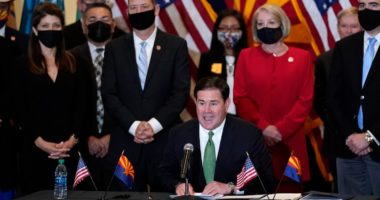
ArizonaGov. By the NFL season, Doug Ducey had desire sports betting to be operational.
He quickly signed the bill legalizing sports betting in Arizona on Thursday, which the legislature had passed earlier in the week.
Ducey even approved the agreements he made with ethnic groups to enhance state gaming.
During his speech in front of the members of the Arizona legislature and cultural leaders, Ducey declared:
The impact of the small amendment to the tribal-state games and the accompanying legislation on our state cannot be emphasized enough. Arizona’s gaming industry, which employs thousands of people and generates millions in tax revenue, contributes significantly to K-12 education, conservation, and treatment facilities. The signing of ‘Today’ symbolizes the result of years of cooperation and involvement among a wide variety of stakeholders. This was achieved by gathering everyone, setting aside personal agendas, and putting Arizona first.
Legislators establish a goal for sports betting by the NFL season.
After reaching an agreement with the nations, Ducey requested Sen. T. J. Shope and Rep. Jeff Weninger to pass the legislation.
The bill permits 10 licenses each for Arizona tribes and professional sports teams/facilities to provide retail and mobile sports betting. An additional 10 licenses are allocated to horse racetracks, but only for retail.
The Bureau of Indian Affairs may have 60 days to inspect the particles after they have been signed by each community.
Weninger states that the bill includes a clause that will become effective immediately upon particle approval. He & nbsp also indicates that this would allow the Arizona Department of Gaming ample time to devise rules and regulations for the state’s inaugural sportsbooks by the beginning of September.
“Will all locations be open and constructed by the start of the football season?” Weninger asked. “No. However, the Cardinals or Diamondbacks could already have their net partner set even if they don’t have a completed sportsbook.”
The objective for September might be positive.
The beginning of the NFL season might be difficult, depending on how fast the particles are authorized.
Not only will the Arizona Department of Gaming need to establish rules and regulations, but it also needs to confirm that each applicant has internal controls in place to initiate sportsbooks and mobile betting apps.
Iowa finished this process faster than any other state, but it still took three months. If the federal government doesn’t approve the particles until mid-June, it could delay the start of the NFL season, which begins on September 9.
However, Weninger did point out that as soon as you start working in the office, you should begin working on the rules and regulations before the federal government approves the particles.
According to Sen. TJ Shope, legislators are also aiming to ready daily fantasy basketball in time for the start of the NFL season.
DraftKings and FanDuel, industry leaders, were not operating in Arizona, one of the few states left. Without issues from the tribal compacts, it seems more probable for Daily Fantasy Sports (DFS) to debut by the NFL season than sports gaming.
Lawmakers handle potential disruptions.
The governor signed the same bill that the House passed on March 4. However, in the subsequent five weeks, it appeared that the bill was on the brink of being derailed.
David Gowan, Chair of the Senate Appropriations Committee, attached his bill aimed at introducing historical horse racing (HHR) to Arizona racetracks. However, tribal groups have stated that such an expansion would breach their agreements.
Last week, after receiving numerous feedback on the subject, Gowan agreed to exclude HHR from the act, thereby creating an opportunity to pass the legislation.
“From the outset, it was a non-starter, and I’m unsure how it will ever be successful due to the manner it’s been implemented in Arizona, thanks to the voter-approved gaming compact,” said Shope. “I don’t believe there was ever a serious threat to the act, apart from HHR.”
Weninger continued, “And so, it simply needed to be dismissed from his council, and then we knew we had the vote.”
Completing sports betting all the way to the end.
During those five months, other potential problems emerged. Barrett-Jackson, a giant in the car auction industry, tried to secure fancy sports betting licenses for its auction event location. Arizona eateries also tried to get involved. However, legislators argued that this was leading to an over-expansion into bar businesses.
Barrett-Jackson received support for obtaining a license and identifying the connection to promote betting on auto racing activities. However, a deal between the governor and the tribes had already been established, making it too late for any alterations at this stage.
Weninger expressed that Barrett-Jackson has had a long-standing presence in the area and has greatly contributed to the financial growth of the state. He voiced his belief that it could potentially open up a new market for betting on races and similar events. However, he acknowledged that achieving this could be challenging at this stage.
In politics, a bill backed by the majority party can get entangled, as was the case in Georgia this year. Hence, when an opportunity arose, legislators seized it to push the bill through, despite having a few weeks remaining in the session.
“Weninger stated, ‘As we approach this time of year, even though individuals remain supportive and strong, they begin to engage in prolonged conflicts on another issue.’ He added, ‘This might spread to areas connected to that issue. Consequently, the concern increases as time goes by. I am relieved that we were able to resolve it without letting such matters hinder us.'”







